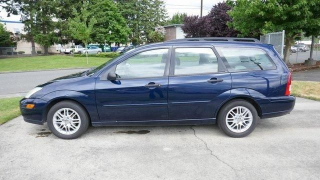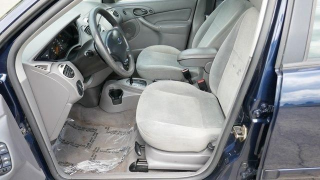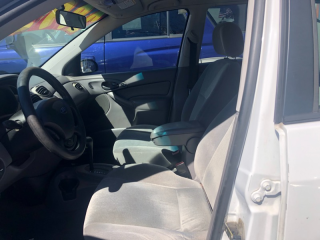The 2002 Ford Focus Wagon, part of the first generation of the popular Ford Focus lineup (1998-2004 in Europe, 2000-2007 in North America), offered a practical and affordable compact wagon option. Key trims included the SE and the more upscale ZTS. New, it ranged from approximately $16,000 to $20,000. It stood out for its European-derived chassis, offering surprisingly agile handling and a refined ride for its class, making it a favorite for value-conscious families and individuals seeking versatility.
The Good
The 2002 Ford Focus Wagon excels in value and practicality, offering a comfortable ride and surprisingly engaging handling for its segment. Its fuel efficiency appeals to practical buyers, while its versatile cargo space and approachable design resonate with those seeking a dependable, everyday vehicle.
The Bad
When considering a 2002 Ford Focus Wagon, be aware of potential issues with the automatic transmission, particularly concerning shuddering or slipping. Some owners have reported electrical gremlins, including faulty power window regulators and instrument cluster problems. Interior materials can show wear over time.
2002 Ford Focus Wagon: Quick Overview
- Engine Options: The 2002 Ford Focus Wagon was primarily offered with two four-cylinder engine options in North America:
- 2.0L Zetec Inline-4
- 2.3L Duratec Inline-4 (less common)
- Horsepower:
- The 2.0L Zetec engine typically produced around 110-130 horsepower, depending on the specific tune and trim.
- The 2.3L Duratec engine offered slightly more power, generally in the range of 145 horsepower.
- Fuel Economy: EPA estimates for the 2002 Ford Focus Wagon generally ranged from 22-24 MPG in the city and 29-32 MPG on the highway, depending on the engine and transmission combination (manual transmissions usually achieved slightly better mileage).
- 0-60 Times: 0-60 MPH times varied depending on the engine and transmission. With the 2.0L engine, it was typically in the 9-11 second range. The more powerful 2.3L engine could achieve closer to 8-9 seconds.
- Towing Capacity: As a compact wagon, the 2002 Ford Focus Wagon was not designed for significant towing. Its towing capacity was generally very limited, often around 1,000 pounds for light loads or trailer with brakes, and not officially recommended for heavy towing.
- Trim-Level Features:
SE Trim: This was the base model and typically included standard features such as air conditioning, power windows and locks (often optional on earlier SE models), a four-speaker AM/FM stereo with CD player, and 15-inch steel wheels.
ZTS Trim: The ZTS offered a more upscale experience and usually added features like 16-inch alloy wheels, upgraded cloth upholstery, a premium audio system, cruise control, and often a rear spoiler. Optional packages could add features like a sunroof, heated front seats, and a rear cargo management system.
2002 Ford Focus Wagon Specifications
Vehicle Information
| Year | 2002 |
| Make | Ford |
| Model | Focus Wagon |
| Trim | - |
| Style | 5-Speed Manual |
| Type | Wagon |
| Category | Small Station Wagon |
Manufacturing Details
| Made In | United States |
| Manufacturing City | WAYNE |
Dimensions
| Doors | 4-Door |
| Curb Weight | 2717 pounds |
| Gross Vehicle Weight Rating | - |
| Overall Height | 53.90 inches |
| Overall Length | 178.20 inches |
| Overall Width | 66.90 inches |
| Wheelbase Length | 103.00 inches |
| Standard Seating | 5 |
Engine & Performance
| Engine | 2.0L L4 SOHC 8V |
| Engine Size | 2L |
| Engine Cylinders | 4 |
| Transmission | 5-Speed Manual |
| Transmission Type | Manual |
| Transmission Speeds | 5-Speed |
| Drivetrain | Front-Wheel Drive |
Additional Features
| Anti-Brake System | Non-ABS 4-Wheel ABS |
| Steering Type | Rack & Pinion |
Pricing
| Manufacturer Suggested Retail Price (MSRP) | $16,750 |
| Invoice Price | $15,691 |
| Delivery Charges | $515 |
Vehicle History Report
Vehicle
Specifications
Specifications
Ownership
History
History
All History
Events
Events
NMVTIS Title
History Check
History Check
Salvage/Rebuilt
Check
Check
Accident
Check
Check
Theft
Check
Check
Open Lien
Check
Check
Past Sale
Listings
Listings
Safety
Recalls
Recalls
Odometer
Check
Check
Market Price
Analysis
Analysis
What Problems Does the 2002 Ford Focus Wagon Have?
The 2002 Ford Focus Wagon, while generally well-regarded for its value, does have some commonly reported issues that potential buyers should be aware of. One of the most frequently cited problems revolves around the automatic transmission. Many owners have experienced transmission shuddering, particularly when accelerating or at lower speeds, which can sometimes escalate to slipping gears or complete failure. This issue is not necessarily specific to the 2002 model year but has been a persistent concern across several early Focus generations.
Electrical system problems are another area to watch. Faulty power window regulators are a common complaint, leading to windows that will not go up or down. The instrument cluster can also develop issues, with flickering gauges or complete failure of certain indicators. Some owners have reported problems with the anti-lock braking system (ABS) module.
On the engine front, while generally robust, some owners have reported oil leaks, particularly from the valve cover gasket. Spark plug blowouts have also been a concern on some models, though this was more prevalent on certain other Ford engines. The exhaust system can also be prone to corrosion and rust over time, especially in areas with harsh winters.
Regarding recalls, it is crucial to check the National Highway Traffic Safety Administration (NHTSA) website for any outstanding recalls specific to the vehicle's Vehicle Identification Number (VIN). While no single widespread, catastrophic recall defined the 2002 model year, smaller recalls related to airbags or braking systems may have been issued.
Long-term reliability can be a mixed bag. With diligent maintenance, many Focus Wagons can last for a considerable number of miles. However, the potential for transmission issues and electrical gremlins can add to ownership costs. The interior, while functional, may show wear and tear more prominently than in some competitors, particularly on high-traffic surfaces like the steering wheel and driver's seat. Overall, while not inherently unreliable, a pre-purchase inspection by a trusted mechanic is highly recommended for any used 2002 Ford Focus Wagon.
Electrical system problems are another area to watch. Faulty power window regulators are a common complaint, leading to windows that will not go up or down. The instrument cluster can also develop issues, with flickering gauges or complete failure of certain indicators. Some owners have reported problems with the anti-lock braking system (ABS) module.
On the engine front, while generally robust, some owners have reported oil leaks, particularly from the valve cover gasket. Spark plug blowouts have also been a concern on some models, though this was more prevalent on certain other Ford engines. The exhaust system can also be prone to corrosion and rust over time, especially in areas with harsh winters.
Regarding recalls, it is crucial to check the National Highway Traffic Safety Administration (NHTSA) website for any outstanding recalls specific to the vehicle's Vehicle Identification Number (VIN). While no single widespread, catastrophic recall defined the 2002 model year, smaller recalls related to airbags or braking systems may have been issued.
Long-term reliability can be a mixed bag. With diligent maintenance, many Focus Wagons can last for a considerable number of miles. However, the potential for transmission issues and electrical gremlins can add to ownership costs. The interior, while functional, may show wear and tear more prominently than in some competitors, particularly on high-traffic surfaces like the steering wheel and driver's seat. Overall, while not inherently unreliable, a pre-purchase inspection by a trusted mechanic is highly recommended for any used 2002 Ford Focus Wagon.
How long will the 2002 Ford Focus Wagon last?
Based on owner data and maintenance records, the 2002 Ford Focus Wagon can achieve an average mileage of 150,000 to 200,000 miles with regular maintenance. Some well-maintained examples have even surpassed 250,000 miles. Its long-term durability is largely dependent on addressing potential issues proactively. The chassis and body are generally resilient, but rust can become a concern in certain climates over extended periods. The primary weaknesses that can limit its lifespan are the automatic transmission and certain electrical components, as previously mentioned. Consistent fluid changes for the transmission and diligent attention to any warning lights can significantly extend the vehicle's service life. Neglecting these areas can lead to premature and costly repairs, limiting its overall durability.
What Technology & Safety Features are Included?
The 2002 Ford Focus Wagon offered a functional, though not cutting-edge, suite of technology and safety features for its time.
Built-in Tech and Entertainment: Standard on most models was an AM/FM stereo system with a single-disc CD player and four speakers, providing a basic audio experience. Higher trims or optional packages could upgrade this to a more sophisticated system with additional speakers (often six) and potentially steering wheel-mounted audio controls. Power windows and door locks were standard on some trims and optional on others, enhancing convenience. Cruise control was typically available on mid-to-higher trims, aiding in highway driving comfort. An optional power sunroof offered an open-air feel. Remote keyless entry was also an available option, adding a layer of security and convenience.
Driver-Assistance Features: Driver-assistance features were relatively limited in 2002. The primary focus was on basic functionality. Features like anti-lock brakes (ABS) were available, often as an option on lower trims and standard on higher trims, helping to prevent wheel lock-up during hard braking. Traction control was not a common feature on this model year.
Safety Features: Standard safety equipment included front airbags for the driver and front passenger. Side-impact airbags were often available as an option, providing enhanced protection in side collisions. Three-point seatbelts were standard for all occupants. The rear doors had child safety locks for added peace of mind for families.
Crash-Test Ratings: According to the National Highway Traffic Safety Administration (NHTSA), the Ford Focus (including the wagon variant) generally performed well in crash tests for its era. It typically received four out of five stars in frontal driver and passenger impact tests, indicating a good level of protection in frontal collisions. Side-impact test results were also generally favorable, though specific ratings could vary slightly depending on whether side airbags were equipped. These ratings contributed to its reputation as a reasonably safe vehicle in its class.
Built-in Tech and Entertainment: Standard on most models was an AM/FM stereo system with a single-disc CD player and four speakers, providing a basic audio experience. Higher trims or optional packages could upgrade this to a more sophisticated system with additional speakers (often six) and potentially steering wheel-mounted audio controls. Power windows and door locks were standard on some trims and optional on others, enhancing convenience. Cruise control was typically available on mid-to-higher trims, aiding in highway driving comfort. An optional power sunroof offered an open-air feel. Remote keyless entry was also an available option, adding a layer of security and convenience.
Driver-Assistance Features: Driver-assistance features were relatively limited in 2002. The primary focus was on basic functionality. Features like anti-lock brakes (ABS) were available, often as an option on lower trims and standard on higher trims, helping to prevent wheel lock-up during hard braking. Traction control was not a common feature on this model year.
Safety Features: Standard safety equipment included front airbags for the driver and front passenger. Side-impact airbags were often available as an option, providing enhanced protection in side collisions. Three-point seatbelts were standard for all occupants. The rear doors had child safety locks for added peace of mind for families.
Crash-Test Ratings: According to the National Highway Traffic Safety Administration (NHTSA), the Ford Focus (including the wagon variant) generally performed well in crash tests for its era. It typically received four out of five stars in frontal driver and passenger impact tests, indicating a good level of protection in frontal collisions. Side-impact test results were also generally favorable, though specific ratings could vary slightly depending on whether side airbags were equipped. These ratings contributed to its reputation as a reasonably safe vehicle in its class.
What Colors Options are Available?
2002 Ford Focus Wagon Prices and Market Value
When new, the 2002 Ford Focus Wagon had an original MSRP ranging from approximately $16,000 for base SE models to around $20,000 for well-equipped ZTS trims. As a vehicle from over two decades ago, its depreciation has been significant. Currently, used 2002 Ford Focus Wagons can be found for anywhere from $1,500 to $5,000, with pricing heavily influenced by mileage, condition, and maintenance history. Models with lower mileage and in excellent mechanical and cosmetic shape will command higher prices. Factors affecting resale value include the presence of rust, the condition of the transmission and engine, and whether regular maintenance records are available. Due to its age, many are purchased for their utility and affordability rather than as a long-term investment, with condition being the paramount factor.
2002 Ford Focus Wagon Cost of Ownership
The 2002 Ford Focus Wagon is generally considered an economical vehicle to own. Insurance costs are typically low, reflecting its modest market value and commonality. Fuel economy is a strong point, with good MPG ratings keeping gas expenses manageable. Routine maintenance, such as oil changes and tire rotations, is also affordable. However, potential buyers should budget for possible repairs, particularly for the automatic transmission and electrical components, which can increase long-term costs. Overall, with careful maintenance and by addressing potential issues promptly, the Focus Wagon remains a cost-effective choice for transportation, making it economical to own.
2002 Ford Focus Wagon Fuel Efficiency
Fuel Type
Gasoline
Fuel Capacity
13.20 gallons
City Mileage
25 miles/gallon
Highway Mileage
32 miles/gallon
2002 Ford Focus Wagon Safety Rating
NHTSA
IIHS
2002 Ford Focus Wagon Warranty
Basic
Original warranty
0 months / No data
Estimated remaining
Expired
Powertrain
Original warranty
0 months / No data
Estimated remaining
Expired
Rust
Original warranty
0 months / No data
Estimated remaining
Expired
2002 Ford Focus Wagon Insurance
Insurance for a 2002 Ford Focus Wagon is moderately priced, reflecting its status as a Wagon with strong safety ratings and
reasonable repair costs.
reasonable repair costs.
How Does the 2002 Ford Focus Wagon Compare to Other Wagon?
The 2002 Ford Focus Wagon competed in a crowded compact wagon segment against rivals like the Honda Civic Wagon, Toyota Corolla Wagon, and Mazda Protege5.
Performance: The Focus Wagon was often praised for its European-derived chassis, offering a more engaging and refined driving experience than many of its competitors. Its handling was considered superior to the often softer-riding Civic and Corolla. The Mazda Protege5, however, offered a sportier feel and more potent engine options.
Features: In terms of features, the Focus Wagon offered a competitive set for its price point, with available power accessories, a decent audio system, and optional amenities like a sunroof. The Corolla Wagon and Civic Wagon were also well-equipped for their class, often lauded for their build quality. The Protege5 sometimes offered a slightly more upscale interior feel and more aggressive styling.
Reliability: This is where the Focus Wagon faced its biggest challenges compared to its Japanese rivals. While generally decent with maintenance, Honda and Toyota have long been benchmarks for bulletproof reliability. The Focus Wagon's common issues with automatic transmissions and electrical components meant it wasn't as universally dependable as a well-maintained Corolla or Civic Wagon. The Protege5 also had its share of reported issues, though perhaps not as consistently as the Focus.
Price: The Focus Wagon was typically positioned as a strong value proposition, often undercutting its Japanese counterparts in initial purchase price, both new and used. This affordability was a major draw for budget-conscious buyers.
Alternatives:
For buyers prioritizing ultimate reliability and lower long-term repair costs, a used Honda Civic Wagon or Toyota Corolla Wagon from the same era would be strong contenders, though they might offer a less dynamic driving experience and potentially higher used prices.
If a sportier feel is desired and you're willing to overlook some potential maintenance quirks, the Mazda Protege5 is a compelling alternative, often praised for its fun-to-drive nature and practical cargo space.
Other considerations could include the Subaru Outback Sport (though typically more expensive) or even a compact SUV like the Honda CR-V or Toyota RAV4 if more robust utility is needed, though these will have higher running costs.
Performance: The Focus Wagon was often praised for its European-derived chassis, offering a more engaging and refined driving experience than many of its competitors. Its handling was considered superior to the often softer-riding Civic and Corolla. The Mazda Protege5, however, offered a sportier feel and more potent engine options.
Features: In terms of features, the Focus Wagon offered a competitive set for its price point, with available power accessories, a decent audio system, and optional amenities like a sunroof. The Corolla Wagon and Civic Wagon were also well-equipped for their class, often lauded for their build quality. The Protege5 sometimes offered a slightly more upscale interior feel and more aggressive styling.
Reliability: This is where the Focus Wagon faced its biggest challenges compared to its Japanese rivals. While generally decent with maintenance, Honda and Toyota have long been benchmarks for bulletproof reliability. The Focus Wagon's common issues with automatic transmissions and electrical components meant it wasn't as universally dependable as a well-maintained Corolla or Civic Wagon. The Protege5 also had its share of reported issues, though perhaps not as consistently as the Focus.
Price: The Focus Wagon was typically positioned as a strong value proposition, often undercutting its Japanese counterparts in initial purchase price, both new and used. This affordability was a major draw for budget-conscious buyers.
Alternatives:
For buyers prioritizing ultimate reliability and lower long-term repair costs, a used Honda Civic Wagon or Toyota Corolla Wagon from the same era would be strong contenders, though they might offer a less dynamic driving experience and potentially higher used prices.
If a sportier feel is desired and you're willing to overlook some potential maintenance quirks, the Mazda Protege5 is a compelling alternative, often praised for its fun-to-drive nature and practical cargo space.
Other considerations could include the Subaru Outback Sport (though typically more expensive) or even a compact SUV like the Honda CR-V or Toyota RAV4 if more robust utility is needed, though these will have higher running costs.
Final Verdict: Is the 2002 Ford Focus Wagon a Good Wagon?
The 2002 Ford Focus Wagon is an ideal choice for budget-conscious individuals or small families seeking a practical, versatile, and surprisingly engaging-to-drive vehicle for everyday commuting and light hauling. It's worth buying primarily on the used market, especially if found in good condition with thorough maintenance records. New, it's no longer an option. Buyers should focus on models with well-documented service history, particularly for the automatic transmission. While not as reliably bulletproof as some Japanese rivals, its lower purchase price often offsets potential repair costs. Opting for a manual transmission can mitigate transmission-related worries. It represents a solid value for those prioritizing affordability and a more dynamic driving experience over absolute long-term, worry-free reliability.



